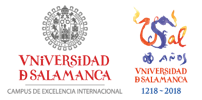Beautiful waste, orderly randomness
Abstract
The image of Heraclitus as the weeping philosopher has been celebrated in the history of the doxography. Plato, himself an heir to the teachings of the universal flux, was reticent to knowledge of the things of the sensible world, formulating his theory of Forms. But the vision of the continuous flux of the sensible is not of pessimism in Heraclitus. With a set of two pairs of opposites, waste / beautiful and random / order, he gives us his definition of the sensible world: “beautiful waste” and “orderly randomness.” As waste and randomness they will be presented to men with their own ideas; it will be necessary to liken the look to the one of a god to see the beauty and order. For whoever that has reached the position before the world that the sage has, which Heraclitus calls for, the flux is shown as the beauty of the cosmos.
References
Aristóteles (2005). Fragmentos. Introducción, traducción y notas de Álvaro Vallejo Campos. Revisión de Francisco Lisi. Madrid: Gredos.
Aristóteles (2012). Retórica [Ret.]. Introducción, traducción y notas de Alberto Bernabé. Madrid: Alianza.
Diels, Hermann; y kranz, Walther (1959). Die Fragmente der Vorsokratiker. Griechisch und Deutsch [DK]. 3 Vols. Berlín: Weidmann.
Heidegger, Martín; y fink, Eugen (1986). Heráclito. Seminario realizado en la Universidad de Friburgo, invierno de 1966-67 [tit. orig.: Heraklit. Seminar Wintersemester 1966–1967, 1970. Trad. Jacobo Muñoz y Salvador Mas]. Barcelona: Ariel.
Hesiodo (2013). Teogonía, Trabajos y Días, Escudo, Certamen. Traducción de Adelaida Martín Sánchez y María Ángeles Martín Sánchez. Madrid: Alianza.
Nietzsche, Friedrich (2003). La filosofía en la época trágica de los griegos. Traducción, prólogo y notas de Luis Fernando Moreno Claros. Madrid: Valdemar.
Copyright (c) 2015 Disputatio. Philosophical Research Bulletin

This work is licensed under a Creative Commons Attribution-NonCommercial-NoDerivatives 4.0 International License.



